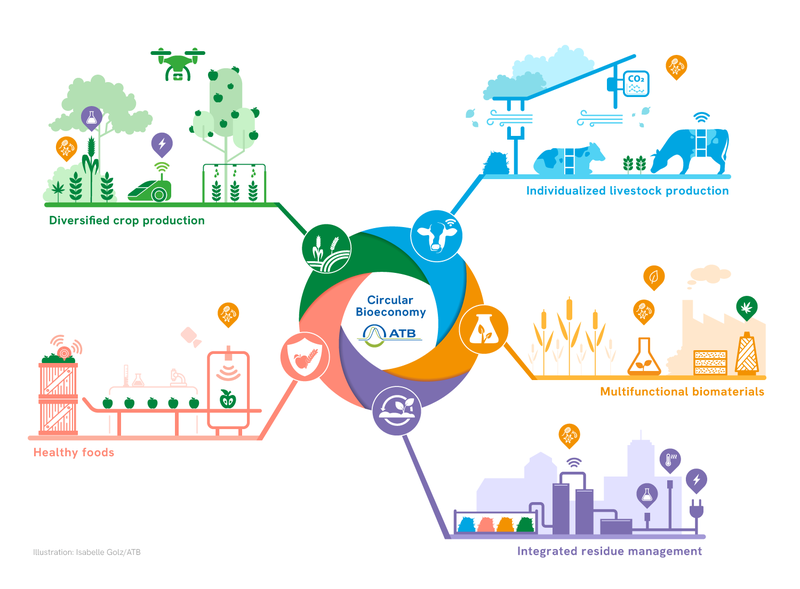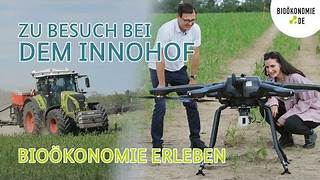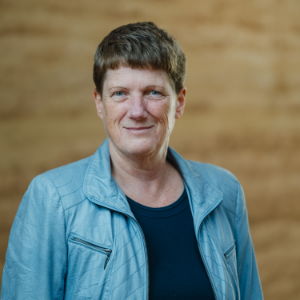Bioeconomy
Using biogenic resources in a circular economy.In a bioeconomy, society uses renewable, regrowing, i.e. biogenic raw materials as the basis for its economy. Fossil resources play no role in a sustainable bioeconomy, while residual materials are of central importance. Production and consumption always generate by-products and residual material flows, i.e. by-products and supposed waste that can be returned to the production cycle as valuable resources. They can be used to produce new bio-based materials and energy. In a bioeconomy, agricultural production plays a key role in the production of raw materials.
Bioeconomic production systems are highly complex: the material flows and processes in agriculture, the food industry and biomass conversion interact with each other in a wide variety of ways and are highly variable.
Knowledge-based, temporally and spatially differentiated and automated
Our research aims at controlling these processes in a knowledge-based, temporally and spatially differentiated and increasingly automated manner. We use sensors, digital technologies and innovative methods of data processing to obtain comprehensive information about the respective material flows and process steps and to derive management strategies from this information.
Focus on microbiome management
And we have the smallest in our focus: microorganisms are the 'greatest' in the bioeconomy. They are indispensable for biological processes - whether for the conversion of nutrients in agricultural soils, for the degradation of substrates in biogas fermenters, for the conversion of substances in biorefineries or even in terms of contamination and spoilage of food.
With our research in the field of microbiome management, we want to gain a better understanding of the microorganisms involved in the various processes. The use of this knowledge can help to further improve the efficiency of bioeconomic production systems.
Innovative business models for the bioeconomy
Together with European partners, we develop new and innovative business models for bio-based value chains and ecosystem services that meet the specific requirements of different regions. At the national and regional level, we also focus on key figures and indicators for monitoring the progress of the bioeconomy and suitable methods for its implementation.
With our flexible, site-specific concepts for a bio-based circular economy, we contribute to meeting the global challenges of food security, climate and environmental protection and animal welfare on a local and individual basis.
Selected research projects on the topic
-
The main aim of the GO-GRASS project is to create new business opportunities in rural areas based on grassland and green fodder that will be demonstrated in four EU regions at small scale, ensuring its replicability all …
-
At the Leibniz Innovation Farm for Sustainable Bioeconomy, innovative concepts and technologies for a sustainable, circular bioeconomy will be developed and tested in future by combining agriculture with crop cultivation…
-
Recent developments render the biobased sector a key player in European Economy providing a great impetus towards Circular Business Models of resource efficiency. Developments in biobased nanomaterials are coupled with b…
-
The BeonNAT project aims to increase knowledge about the extraction of various organic products from wood species, trees and shrubs that are currently underutilized. The project evaluates the key aspects in the value cha…
-
At present, 60-70% of all soils are unhealthy in Europe as a result of land management practices, pollution, intensive agriculture, urbanisation, and the effects of climate change. Due to this and other biophysical const…
More projects on the topic ...
Selected publications
- Jander, W. (2021): Advancing Bioeconomy Monitorings: A Case for Considering Bioplastics. Sustainable Production and Consumption. (März 2022): p. 255-268. Online: https://doi.org/10.1016/j.spc.2021.11.033
- Jander, W. (2021): An extended hybrid input-output model applied to fossil- and bio-based plastics. MethodsX. : p. 101525. Online: https://doi.org/10.1016/j.mex.2021.101525
- Ding, Z.; Grundmann, P. (2022): Development of Biorefineries in the Bioeconomy: A Fuzzy-Set Qualitative Comparative Analysis among European Countries. Sustainability. (1): p. 90. Online: https://doi.org/10.3390/su14010090
- López Gómez, J.; Unger, P.; Schneider, R.; Venus, J. (2020): From Upstream to Purification: Production of Lactic Acid from the Organic Fraction of Municipal Solid Waste. Waste and Biomass Valorization. : p. 5247-5254. Online: https://doi.org/10.1007/s12649-020-00992-9
- Orozco, R.; Mosquera-Losada, M.; Rodriguez, J.; Adamseged, M.; Grundmann, P. (2021): Supportive business environments to develop grass bioeconomy in Europe. Sustainability. (22): p. 12629. Online: https://doi.org/10.3390/su132212629
More publications on the topic ...




